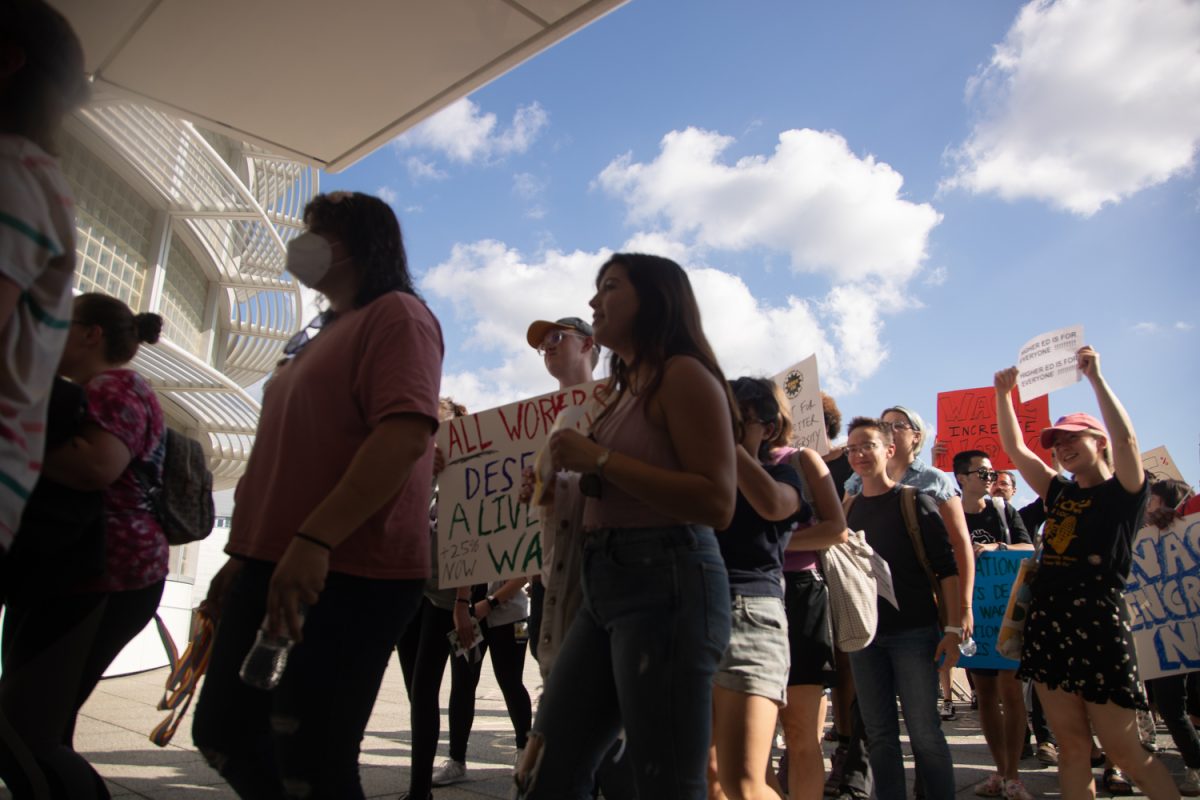The Campaign to Organize Graduate Students chanted “Education is a right, not just for the rich and white” as they entered the state Board of Regents meeting on Wednesday to demand a wage increase.
The protest outside of the Levitt Center for University Advancement lasted an hour and a half and caused the regents’ meeting to end early.
COGS is protesting for a higher minimum wage, arguing for an increase in the minimum wage by 25 percent, according to COGS President Hannah Zadeh. The average graduate assistant’s minimum wage is $21,329 for a nine-month period at a half-time rate, estimated to be approximately $31.74 per hour. At a full-time rate, this amounts to a total of $66,019, UI officials stated.
“A wage increase is necessary to keep up with inflation,” Zadeh said.
According to COGS’ most recent contract agreement, returning bargaining employees received a 3 percent minimum salary increase after asking for a 10 percent hike. COGS bargained its current contract on July 31, which will last until June 2025.
Union members protested with handmade signs and megaphones during the regents meeting Wednesday. Protesters were then led through a series of chants, including “This what democracy looks like, corporate greed has got to go,” and more.
After entering the room where the meeting was being held for public comment, the regents were forced to end their meeting early because of the disruption and noise of the protestors.
RELATED: Regents to consider tuition increases at Iowa’s three public universities
Toward the end of the protest, union members were informed that protesters were being turned away at the door, eliciting more negative emotions.
The university covers all or most of the graduate assistant’s tuition and health benefits with an appointment of 25 percent or greater, or 10 hours a week, UI assistant vice president for external relations Jeneane Beck, said.
Josh Lehman, regents senior communications director, wrote in an email to The Daily Iowan that graduate assistants are frequently eligible for other forms of financial aid.
“The UI and Iowa Board of Regents continuously evaluates multiple factors when considering graduate assistant compensation,” Lehman wrote.
However, most graduate assistants receive half-time appointments with the possibility of receiving additional funds during the summer, Beck said.
“Many graduate students rely on food banks to make ends meet, and shockingly, untenured professors have begun to rely on these banks as well,” UI COGS Political Activist Chair Nicole Yeager said. “It is pretty horrific in a lot of ways. Someone in my program spends 20 hours of work doing research and then another 30 hours doing clinical work before they even have time to get to their coursework.”
Yeager said when people do not have the time to cover their cost of living, it becomes increasingly more difficult to afford rent, food, and other general expenses.
“There are times that I skip meals. If there isn’t enough food in my lunch for the day, I just don’t eat because I don’t have that money,” Yeager said.
Yeager said she put off going to graduate school after becoming a mother and believed that taking time off and saving money would be able to get her through graduate school when she came back. Because of inflation, however, that was not the case.
The COGS protest not only drew the attention and participation of union members but also of members of other labor federations.
A member of Iowa City’s Federation of Labor Gary Sanders said the UI does not compensate their graduate student employees fairly.
“It has been like that for a long time. We have seen the higher administrative jobs get more and more money and the graduate students who teach and take classes are getting short-changed,” Sanders said.



